The following alternative to the three-list view of spiritual gifts would clarify many difficulties, but has its problems as well. Instead of strict divisions, the three lists could be overlapping aspects of the same phenomena. Like the Trinity, they should always occur together: Gift, service, and manifestation―in that order. We have a gift, we engage in service using that gift, and the Holy Spirit manifests His presence through that gift according to the service we are engaged in.
If we view each of the three passages as three layers of one truth it will help explain the paradox. First that there are elements in each passage which are difficult to harmonize with the other two, and second that there are aspects of each passage which clearly tie them all together as speaking of the same phenomena. The three-layer view is a unified picture: The fluid and adaptable manner in which the Holy Spirit works through the fixed structure of the Body of Christ.
Each list focuses on one aspect of the whole. In Romans 12 we have the actual gifts which by implication become engaged in service giving the context for the Spirit to show His presence. In Ephesians 4 we have not gifts but gifted men, given to serve the church, usually as part of a local body. Then in I Corinthians 12 the manifestations or results are listed, and the gifts and service must be inferred. This perspective could give meaning to the odd terminology used in the “word of wisdom” and “word of knowledge.” The gifts of knowledge and wisdom lie behind them and when engaged in service give rise to the “utterance” or “word” of knowledge or wisdom manifested by the Spirit.
An analogy would be that each of the three gift passages is a lens. Each lens is incomplete in itself, so that we must layer the lenses, one on top of another, and view the Body of Christ through all three at the same time to have a proper focus. This will not only bring the Body of Christ into perspective, though, but will bring each individual gift passage into perspective. We can then see that there are missing aspects of each passage that can only be seen through the lens of the other two. The following two charts show the different conceptual framework of each spiritual gifts passage. The next three charts show the new perspective we can gain on each passage in relation to the whole picture.
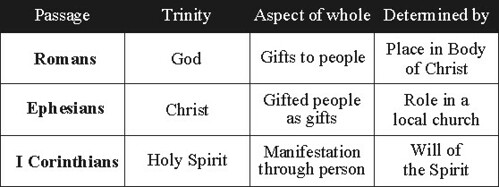
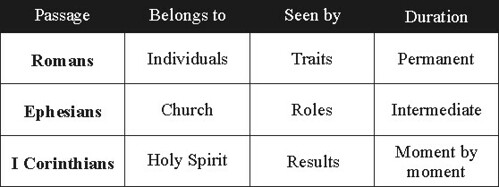
Passage: Romans 12: 4-6
Focus: God the Father
Introduction to the List: “We have gifts that differ according to the grace given to us.” (Romans 12:6a, NRSV)
What the list consists of: Gifts / charismata
Action: Gifts are given to us
Distinctive aspects of the list: 1.) This is the only list where we are exhorted to “use” what is listed. 2.) All of the gifts except mercy are easily rendered into titles, i.e. giving : giver; leadership : leader; encouragement : encourager.
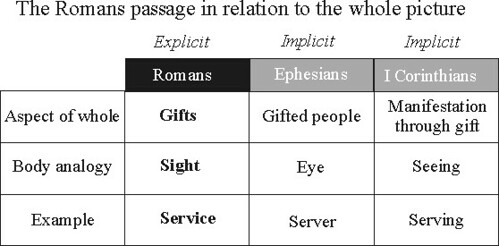
Romans 12: 6-8 is a list of gifts. It is in fact our only list of gifts. There are no leaders or teachers, per se, only the things (gifts) that make people leaders or teachers. What is listed here are abilities—potentials that must be put to use, as Paul urges after each one. These gifts are the first stage in a triad that mirrors the trinity. The gifts can exist without the other two parts of the triad, but that is to waste their potential and their purpose.
Passage: Ephesians 4:7-16
Focus on: Jesus Christ (God the Son)
Intro to the list: “Therefore it is said, ‘When He ascended on high he made captivity itself a captive; he gave gifts to his people.’” (Eph. 4:8, NRSV)
What the list consists of: Gifted people / domata
Action: People with gifts are given to each other to serve as part of a local body of believers
Distinctive Aspects of the List: 1.) This is the only list, with the exception of the supplemental lists of I Corinthians 12:28-29, which gives titles for gifted people. 2.) This is the only list completely lacking the term “charismata.”
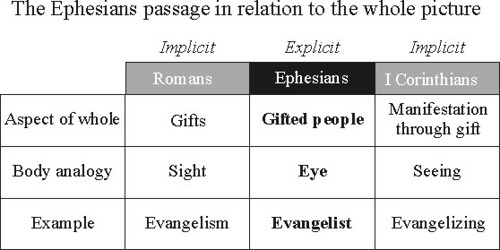
Ephesians 4:7-9 is a list of five titles. The gifts (charismata) are not listed here although we can infer that gifts lie behind the titles. We know from Romans 12 that prophecy and teaching are gifts, so the prophets and teachers from Ephesians 4 should have the matching gifts. This logic also tells us that the evangelists and pastors should also have gifts behind their titles. So while evangelism and pastoring are nowhere named as gifts, we can safely assume that the gifts do exist behind the titles of evangelist and pastor.
Passage: I Corinthians 12: 1-31
Focus: Holy Spirit
Introduction to the list: “To each is given the manifestation of the Spirit for the common good.” (I Cor. 12:7, NRSV)
What the list consists of: Manifestations of the Spirit / phanerosis
Action: The Holy Spirit manifests Himself through us according to our position in the Body of Christ.
Distinctive aspects of the list: 1.) The gifts which are “miraculous by definition” are listed only here. 2.) This is the only list containing double plurals: The four miraculous gifts plus “discernments of spirits.” 3.) The term “manifestation” or phanerosis in the Greek occurs in no other gift passage.
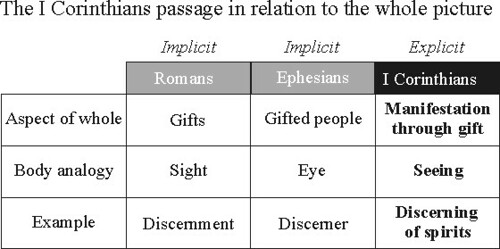
I Corinthians 12:4-6 contains a list of manifestations, the results of gifts yielded in service. This is the part the Corinthians struggled with, not the actual gifts (I Cor. 1:7). Paul told them “You come behind in no gift,” but they were not using those gifts to serve one another in the Spirit. The manifestation is the third part of the triad and can only occur when the other two parts are yielded in love through service.
The analysis so far suggests a picture of the Corinthian problem[1]. They may not have been exalting gifts at all, but manifestations, especially manifestations which are “miraculous by definition,” i.e. tongues, miracles, and healing. These would produce “awe and wonder” in the people witnessing them and would likely raise the status of the person acting as a channel for the manifestation. Pride, as noted by many commentators, might have been the central issue for these Corinthians, and Paul responded by pointing out that even the “ordinary” gifts produce manifestations which are just as vital to the health of the body as the supernatural manifestations.
This perspective would imply that the five “ordinary” gifts in I Cor. 8-12 were not considered miraculous or, for the most part, revelational in character, even in the early church. This would include faith, discernment, knowledge, wisdom, and prophecy. It may be that these gifts took on a supernatural character in the minds of many by their association with the more obviously miraculous gifts.
The List from I Corinthian 12: 28-30
The list of gifts found at the end of I Cor.12 seems to be a composite of the other three, including gifts, gifted people, and manifestations. This section may just be a summary of the whole picture of spiritual gifts, services, and manifestations; but it may also provide exegetical difficulties for the layered-category concept.
Reflections
• Each list is introduced by a correct label for the contents of the list; I Corinthians : manifestations (phanerosis); Ephesians : gifts (domata); Romans : grace-gifts (charismata). In other words, Paul uses basic rules of grammar in these passages by telling us what he is about to include in the list to follow.
• Every title (Ephesians) and every manifestation (I Corinthians) has a gift behind it. Therefore, all three lists, plus I Cor. 12:28, can be used to create a final gift list.
Footnotes
[1] So many ideas have been offered as to what the Corinthian “problem” was, that it may strike others as presumptuous to offer a new one built on a highly speculative idea. This may be so, but the idea is not entirely new—it is a derivative of a couple of ideas already in circulation, and one that seems to explain the evidence fairly well, given that the premise (layered-category view) is true.
1.) Romans is a list of the actual gifts.
2.) Ephesians then lists the people with gifts as they become gifts to each other in service.
3.) I Corinthians then lists the manifestation of the Holy Spirit which is peculiar to the gift and to the service in which the gift is engaged.
Key verses : “Now there are varieties of gifts, but the same Spirit. And there are varieties of ministries, but the same Lord. And there are varieties of effects, but the same God who works all things in all persons” (1 Corinthians 12:4-6).
If we view each of the three passages as three layers of one truth it will help explain the paradox. First that there are elements in each passage which are difficult to harmonize with the other two, and second that there are aspects of each passage which clearly tie them all together as speaking of the same phenomena. The three-layer view is a unified picture: The fluid and adaptable manner in which the Holy Spirit works through the fixed structure of the Body of Christ.
Each list focuses on one aspect of the whole. In Romans 12 we have the actual gifts which by implication become engaged in service giving the context for the Spirit to show His presence. In Ephesians 4 we have not gifts but gifted men, given to serve the church, usually as part of a local body. Then in I Corinthians 12 the manifestations or results are listed, and the gifts and service must be inferred. This perspective could give meaning to the odd terminology used in the “word of wisdom” and “word of knowledge.” The gifts of knowledge and wisdom lie behind them and when engaged in service give rise to the “utterance” or “word” of knowledge or wisdom manifested by the Spirit.
An analogy would be that each of the three gift passages is a lens. Each lens is incomplete in itself, so that we must layer the lenses, one on top of another, and view the Body of Christ through all three at the same time to have a proper focus. This will not only bring the Body of Christ into perspective, though, but will bring each individual gift passage into perspective. We can then see that there are missing aspects of each passage that can only be seen through the lens of the other two. The following two charts show the different conceptual framework of each spiritual gifts passage. The next three charts show the new perspective we can gain on each passage in relation to the whole picture.


Romans
Passage: Romans 12: 4-6
Focus: God the Father
Introduction to the List: “We have gifts that differ according to the grace given to us.” (Romans 12:6a, NRSV)
What the list consists of: Gifts / charismata
Action: Gifts are given to us
Distinctive aspects of the list: 1.) This is the only list where we are exhorted to “use” what is listed. 2.) All of the gifts except mercy are easily rendered into titles, i.e. giving : giver; leadership : leader; encouragement : encourager.

Romans 12: 6-8 is a list of gifts. It is in fact our only list of gifts. There are no leaders or teachers, per se, only the things (gifts) that make people leaders or teachers. What is listed here are abilities—potentials that must be put to use, as Paul urges after each one. These gifts are the first stage in a triad that mirrors the trinity. The gifts can exist without the other two parts of the triad, but that is to waste their potential and their purpose.
Ephesians
Passage: Ephesians 4:7-16
Focus on: Jesus Christ (God the Son)
Intro to the list: “Therefore it is said, ‘When He ascended on high he made captivity itself a captive; he gave gifts to his people.’” (Eph. 4:8, NRSV)
What the list consists of: Gifted people / domata
Action: People with gifts are given to each other to serve as part of a local body of believers
Distinctive Aspects of the List: 1.) This is the only list, with the exception of the supplemental lists of I Corinthians 12:28-29, which gives titles for gifted people. 2.) This is the only list completely lacking the term “charismata.”

Ephesians 4:7-9 is a list of five titles. The gifts (charismata) are not listed here although we can infer that gifts lie behind the titles. We know from Romans 12 that prophecy and teaching are gifts, so the prophets and teachers from Ephesians 4 should have the matching gifts. This logic also tells us that the evangelists and pastors should also have gifts behind their titles. So while evangelism and pastoring are nowhere named as gifts, we can safely assume that the gifts do exist behind the titles of evangelist and pastor.
I Corinthians
Passage: I Corinthians 12: 1-31
Focus: Holy Spirit
Introduction to the list: “To each is given the manifestation of the Spirit for the common good.” (I Cor. 12:7, NRSV)
What the list consists of: Manifestations of the Spirit / phanerosis
Action: The Holy Spirit manifests Himself through us according to our position in the Body of Christ.
Distinctive aspects of the list: 1.) The gifts which are “miraculous by definition” are listed only here. 2.) This is the only list containing double plurals: The four miraculous gifts plus “discernments of spirits.” 3.) The term “manifestation” or phanerosis in the Greek occurs in no other gift passage.

I Corinthians 12:4-6 contains a list of manifestations, the results of gifts yielded in service. This is the part the Corinthians struggled with, not the actual gifts (I Cor. 1:7). Paul told them “You come behind in no gift,” but they were not using those gifts to serve one another in the Spirit. The manifestation is the third part of the triad and can only occur when the other two parts are yielded in love through service.
The analysis so far suggests a picture of the Corinthian problem[1]. They may not have been exalting gifts at all, but manifestations, especially manifestations which are “miraculous by definition,” i.e. tongues, miracles, and healing. These would produce “awe and wonder” in the people witnessing them and would likely raise the status of the person acting as a channel for the manifestation. Pride, as noted by many commentators, might have been the central issue for these Corinthians, and Paul responded by pointing out that even the “ordinary” gifts produce manifestations which are just as vital to the health of the body as the supernatural manifestations.
This perspective would imply that the five “ordinary” gifts in I Cor. 8-12 were not considered miraculous or, for the most part, revelational in character, even in the early church. This would include faith, discernment, knowledge, wisdom, and prophecy. It may be that these gifts took on a supernatural character in the minds of many by their association with the more obviously miraculous gifts.
The List from I Corinthian 12: 28-30
The list of gifts found at the end of I Cor.12 seems to be a composite of the other three, including gifts, gifted people, and manifestations. This section may just be a summary of the whole picture of spiritual gifts, services, and manifestations; but it may also provide exegetical difficulties for the layered-category concept.
Reflections
• Each list is introduced by a correct label for the contents of the list; I Corinthians : manifestations (phanerosis); Ephesians : gifts (domata); Romans : grace-gifts (charismata). In other words, Paul uses basic rules of grammar in these passages by telling us what he is about to include in the list to follow.
• Every title (Ephesians) and every manifestation (I Corinthians) has a gift behind it. Therefore, all three lists, plus I Cor. 12:28, can be used to create a final gift list.
Footnotes
[1] So many ideas have been offered as to what the Corinthian “problem” was, that it may strike others as presumptuous to offer a new one built on a highly speculative idea. This may be so, but the idea is not entirely new—it is a derivative of a couple of ideas already in circulation, and one that seems to explain the evidence fairly well, given that the premise (layered-category view) is true.
powered by performancing firefox
No comments:
Post a Comment